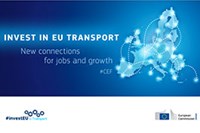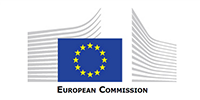
The European Commission launched today the third round of calls for proposals under the Connecting Europe Facility (CEF) for transport, making €1.9 billion available to finance key transport projects. €1.1 billion are earmarked for projects in Member States eligible for financing from the EU Cohesion Fund, in order to better integrate these countries into the internal market. Along with the Investment Plan presented by the Commission in November 2014 – and in particular the new European Fund for Strategic Investments (EFSI) , the CEF aims at bridging the investment gap in Europe to boost growth and job creation, a priority of President Jean-Claude Juncker.
EU Commissioner for Transport Violeta Bulc remarked: "The EU supports over 460 projects across the territory of the Member States contributing to better mobility and connectivity for European citizens and businesses. With this new call, we are giving more focus to intelligent transport systems across Europe and to infrastructure development in the cohesion states. The Commission is committed to building the transport network of the future while providing to keep countries and regions united."
This year's calls continue to focus on innovative transport to improve safety and environmental performance, increase efficiency and build cross-border connections. For the first time, a specific priority (provided for with €110 million) addresses smaller cross-border projects, located on the comprehensive network, which shall help bringing regions closer together and enhancing their accessibility.
“Although we have been investing a lot in improving transport infrastructure, there is underinvestment in many smaller cross-border sections, and bottlenecks and missing links remain. I therefore welcome the new Commission initiative to scale up support for smaller cross-border projects and in particular railway connections, to help develop local and regional transport infrastructure stimulating development of border regions" said Michael Cramer, Chair of the Transport and Tourism Committee of the European Parliament.
"Funding small-scale cross-border infrastructure shows that Europe cares about the everyday life of hundreds of thousands of citizens and workers. It requires limited resources but can have a big impact on territorial cohesion and help our common market to work properly. This call is an encouraging step also with a view to the discussion on investment for missing links within the next EU budget", said Mr Raffaele Cattaneo, President of the Lombardia Region Council and chair of the Commission for Territorial Cohesion Policy of the European Committee of the Regions.
Overall, the calls make €840 million available to all 28 Member States ('General envelope') for cross-border infrastructure projects and for projects covering innovation and new technologies and traffic management systems such as the European Railway Traffic Management System (ERTMS), Intelligent Transport Systems for roads (ITS) or the Single European Sky Air Traffic Management Research (SESAR) Programme. Of this amount, €40 million will be dedicated to infrastructure projects to connect with neighbouring countries.
The "cohesion" envelope (€1.1 billion, available to 15 Member States) will add key infrastructure projects on the TEN-T core network in sustainable transport modes such as rail and inland waterways to these priorities.
Support will be granted on a competitive basis in the form of EU co-financing, following a thorough evaluation and selection process. Applicants will have until 7 February 2017 to submit their proposals. The outcome of the calls will be published by summer 2017.
About European Commission
Transport directly affects everyone in Europe. Whatever age we are, and whatever activities we undertake, transport and mobility play a fundamental role in today’s world. The aim of the Commission is to promote a mobility that is efficient, safe, secure and environmentally friendly and to create the conditions for a competitive industry generating growth and jobs. The issues and challenges connected to this require action at European or even international level; no national government can address them successfully alone. The European Commission’s Directorate-General for Mobility and Transport works in concert with the European Union Member States, European industry, citizens and stakeholders.




Comments
There are no comments yet for this item
Join the discussion